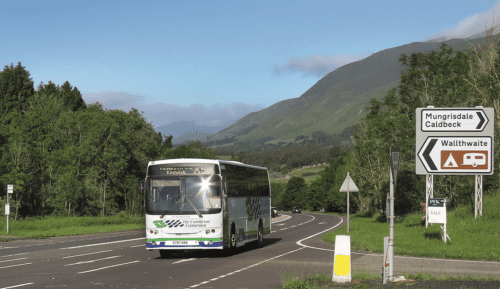
A modern classic has been returned to service in a short-lived but interesting livery, reports Adrian Morton
In 1998 Stagecoach broke from the norm and ordered its latest coaches from Jonckheere, instead of using its traditional supplier, Plaxton. As well as ordering Jonckheere Mistral-bodied coaches for National Express commitments, it opted to buy the manufacturer’s Modulo bodies for its own inter-urban work, based on the ever-reliable Volvo B10M chassis.
Stagecoach Cumbria received four of these Modulo coaches for its X4/X5 services between Workington and Penrith via Cockermouth and Keswick. These coaches, registered S796-9 KRM (796-9), were initially received in the then current striped livery, with additional branding for the route. They marked a huge improvement in terms of reliability and comfort for passengers.
Fast forward to the 2000s and with the opening of the new Rheged lakeland heritage centre on the outskirts of Penrith, a new Cumbria Connexion livery was born. At the same time Stagecoach received two new Alexander ALX300 buses on MAN chassis. Registered X813/4 SRM they were used on additional short workings between Penrith and Keswick, introducing low-floor buses to the route and numbered X50. The four Jonckheere Modulo coaches received the new livery, each also being named after a place along the route. Bus 797 was named ‘Workington Hall,’ one of the first landmarks on the route.
Short-lived
The striking livery came and went very quickly, and by 2005 all four coaches had been repainted into the new standard ‘beachball’ colours which became prevalent across all Stagecoach fleets. Within two years and with preparation for PSVAR compliance, four Plaxton Profile coaches fitted with front-mounted wheelchair lifts, and based on Volvo B7R chassis, were delivered as replacements for the route. These coaches bore the common corporate identity but with additional ‘Trans Cumbria’ decals.
Whilst three of the four coaches remained in the Cumbria region, 798 found a new home with Stagecoach in South Wales. 796 and 797 were transferred to Carlisle depot for use on service 685 between there and Newcastle, whilst 799 was kept at Lillyhall for any work that might get thrown at it. 796 and 797 later returned to Lillyhall, where 796 would subsequently suffer an engine fire and be scrapped. 799 was sold, ending up with DJ International in Wales before eventually being exported to Africa. This left just 797 in the fleet. It soldiered on, mostly confined to schools, until late 2019, before being marked for disposal. Stagecoach Cumbria and North Lancashire then generously donated the vehicle to the Workington Transport Heritage Trust (WTHT), where it has been kept in revenue-earning service ever since.
[…]By subscribing you will benefit from:
- Operator & Supplier Profiles
- Face-to-Face Interviews
- Lastest News
- Test Drives and Reviews
- Legal Updates
- Route Focus
- Industry Insider Opinions
- Passenger Perspective
- Vehicle Launches
- and much more!


